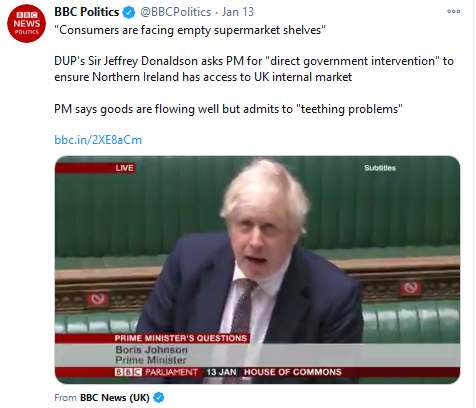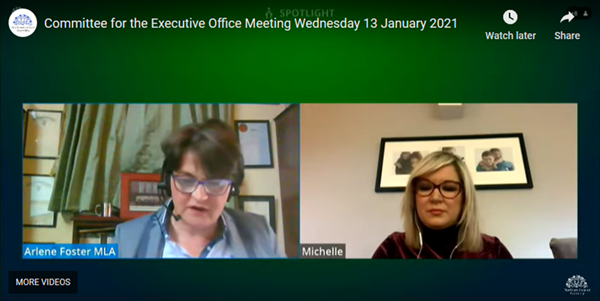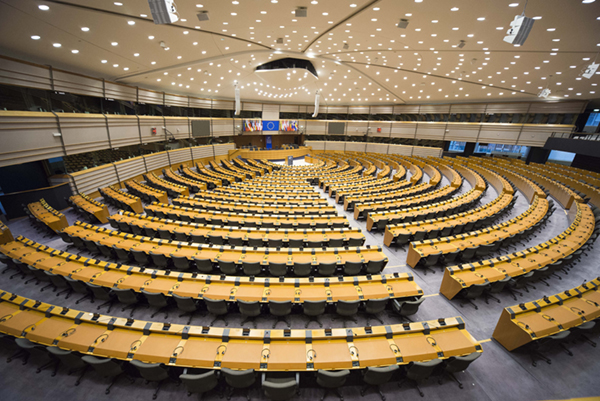Brexit Brief Newsletter
18 January 2021

Welcome to the 18 January 2021 newsletter
Last week, UK Government Ministers, the Prime Minister, and Northern Ireland Executive Ministers were challenged to explain what they will do to deal with the issues which have been experienced by businesses and consumers since the end of the transition period. The European Parliament began its scrutiny of the UK-EU Trade and Cooperation Agreement, and Committees continue to hear evidence on the implications of the deal for various sectors.
Johnson and Gove questioned on the Protocol
On Wednesday 13th January, DUP MP Jeffrey Donaldson asked the Prime Minister Boris Johnson in the House of Commons about the issues facing Northern Ireland: he said there were empty shelves in supermarkets, issues with parcel delivery from GB, supply chain issues from GB for small businesses, and NI steel importers are facing tariffs. He pointed out that this is despite Johnson’s promise that NI would continue to have unfettered access to the UK Single Market.
Johnson stated that goods are “flowing effectively” and in normal volumes between GB and NI, and that no lorries have been turned back. He called the issues “teething problems” and stated that if there are problems his Government believes are disproportionate, it will have no hesitation in invoking Article 16 of the Protocol on Ireland/Northern Ireland. Article 16 states that if the Protocol “leads to serious economic, societal or environmental difficulties that are liable to persist, or to diversion of trade” the EU or the UK may unilaterally take “appropriate safeguard measures”.

Source: BBC Politics on Twitter
Chancellor of the Duchy of Lancaster Michael Gove, who is responsible for relations with the EU, took further questions on the operation of the Protocol and disruptions to trade. He said he is working with companies across GB to help them understand the new rules. On mixed food consignments, known as ‘groupage’, Gove said new guidance will be issued in the coming days. He said the UK Government is committed to pragmatic solutions to all problems which arise and he is in daily contact with NI Executive Ministers. Regarding steel tariffs*, Gove said they were seeking to provide a guarantee that companies will not have to pay, by using a quota or rebate scheme. He said a solution has been found on VAT for second-hand vehicles: a margin scheme will be reinstated so NI customers do not need to pay more than the rest of the UK. MPs questioned Gove on the end of the grace periods which loom in the coming months, and raised concerns that there are no alternative mitigations in place. Gove said he is working with supermarkets to make sure they are ready and make the European Commission aware of the consequences if supermarkets cannot continue with their service.
* The issue of the steel tariffs of up to 25% arises from an EU protective measure taken after the US imposed tariffs on steels and aluminium. Under the Protocol, this would mean Northern Ireland’s steel imports from third countries would face this tariff, as would steel imports from Britain once its quota is exceeded.
First Minister and deputy First Minister questioned by MLAs
On Wednesday 13 January, the Committee for the Executive Office heard evidence on Brexit from First Minister Arlene Foster and deputy First Minister Michelle O’Neill. O’Neill noted that while NI businesses have been preparing well, they are bearing the brunt of lack of preparation by GB businesses.
Foster noted that the issue of VAT for second-hand cars has been resolved, while the UK DEFRA Minister is working on a solution to ‘groupage’. She is seeking solutions in other areas such as pet travel e.g. for guide dogs. Foster said they would be raising the 25% steel tariff with Michael Gove. Looking at a potentially more positive side, she argued that if supermarkets are increasing the number of NI products in their supermarkets, this is a good thing, however she wouldn’t want consumers to see a reduction in the offerings at supermarkets. O’Neill noted that there has been some progress but stated “these are the realities of Brexit”.

Arlene Foster and Michelle O'Neill address the Committee Source: NI Assembly
The Committee asked about the mechanics of invoking Article 16 of the Protocol and whether the Executive has a role. Foster said it is for the UK Government, and referred to the Prime Minister’s statement in the House of Commons on the potential use of Article 16. Foster pointed to the role of the Joint Committee, responsible for the implementation of the Protocol, where the First Minister and deputy First Minister have “observer status”: Foster said it was useful to be involved in this in the latter part of last year.
Foster confirmed that the initial programme of funding for PEACE+ has increased with extra UK Government funding, which brings the total programme to around £1 billion. There is not yet clarity on the Shared Prosperity Fund, intended to replace EU funding schemes. If it is a competitive fund, this would be more challenging for NI.
The Committee was also updated by officials on Common Frameworks who noted that the profile of the frameworks has increased since the introduction of the Internal Market Act, and the establishment of the Lords Common Frameworks Scrutiny Committee. The impact of Brexit on the institutions and North/South and East/West relationships was also discussed. Officials explained the work undertaken by the North-South Ministerial Council since the Brexit referendum in 2016, noting that the meetings were very positive, and that this is there is opportunity for stakeholders and “groups on the ground” to bring issues to the ministers and the NSMC.
European Parliament begins scrutiny
Last week the European Parliament began its scrutiny of the Trade and Cooperation Agreement (TCA) in several committees, including the Committee for International Trade, and the Committee for Foreign Affairs. MEPs agreed that a deal was a positive development but called the agreement ‘thin’, reflecting the stance of the UK: MEPs would have preferred the UK to participate in Erasmus, and to have closer EU-UK cooperation on foreign policy, security and defence. MEPs stressed that they must have thorough access to information to properly scrutinise the deal, and a role in monitoring the agreement as it is implemented.

European Parliament Plenary Source: European Union 2016 - EP Paul-Henri SPAAK building
Rapporteur of the Foreign Affairs Committee Kati Piri said, “we did not want or choose Brexit… and sadly, the agreement itself falls far short of the Political Declaration that UK Prime Minister Boris Johnson himself signed just months prior to the negotiations.” The rapporteurs will draw up a consent proposal for MEPs to vote on. The Parliament has emphasised that the provisional application process should not be repeated. The agreement is being applied provisionally as there was not enough time for the European Parliament to properly scrutinise and ratify the agreement by the end of the transition period. Provisional application lasts until 28 February, although a proposal has been made to extend this.
Other news
- The House of Commons Future Relationship with the EU Committee held its last evidence session with business stakeholders on 13 January: the Committee ceased to exist on 16 January. Committee Chair Hilary Benn expressed the need for scrutiny of the UK-EU Trade and Cooperation Agreement. The Committee’s report on the shape of future parliamentary scrutiny of UK-EU relations will be published on 21 January.
- The House of Commons Northern Ireland Affairs Committee heard evidence from academics on the implications of the EU-UK Trade and Cooperation Agreement for cross-border cooperation on policing, security and criminal justice. The agreement was never going to be able to replicate the level of cooperation the UK enjoyed as part of the EU, but it is not a bad deal and there are areas where cooperation could be enhanced in the future. Colin Murray of Newcastle University described it as a deal which “keeps the lights on” in terms of justice and security.
- The Irish Government has published a preliminary analysis of the impact of Brexit on its fishing sector. Ireland and Germany have been hardest hit, with a 15% reduction in the value of their quota share by 2026. The Committee for Agriculture, Environment and Rural Affairs will hear from Northern Ireland Fishermen's Federation tomorrow (Tuesday 19th) on the impact of Brexit on its industry.
- Professors David Phinnemore and Katy Hayward of Queen’s University have written a blog on Article 16 of the Protocol on Ireland/Northern Ireland, which has been much discussed in recent weeks as a potential mechanism to counter the issues which have arisen since the end of the transition period. The professors argue that Article 16 offers ‘no quick fix’ and is not a means to unilaterally disapply the Protocol.
Catch up with the Committees
- Wednesday 13 January, 2pm - Committee for the Executive Office - Oral Briefing from First Minister and deputy First Minister; Oral evidence from Departmental Officials on Assessment of the impact of Brexit on the institutions and North/South and East/West relationships, Brexit - Update on Common Frameworks
- Thursday 14 January, 10am - Committee for Agriculture, Environment and Rural Affairs - EU Transition and Priorities for 2021; Common Framework on Waste; Agricultural policy developments - UK, Ireland and other selected jurisdictions; EU Exit legislation - Oral Evidence from DAERA, Briefing from RaISe
This Week at the Assembly
- Monday 18 January, 12pm – Plenary - NSMC Plenary and Institutional Meetings - Ministerial statement; Question Time - Agriculture, Environment and Rural Affairs
- Tuesday 19 January, 1pm - Committee for Agriculture, Environment and Rural Affairs - Evidence from Northern Ireland Fishermen's Federation on impact of EU Exit
- Wednesday 20 January, 11.15am - Committee for Infrastructure - Brexit - Issues facing the freight/haulage sector: Briefing from Northern Ireland Retail Consortium, Logistics UK and Road Haulage Association
- Wednesday 20 January, 10am - Committee for Economy - Update on EU Exit from Katy Hayward & David Phinnemore
- Wednesday 20 January, 2pm - Committee for Finance - Oral Briefing from Solace NI and NILGA on EU Successor Funding in Northern Ireland
- Thursday 21 January, 10am - Committee for Agriculture, Environment and Rural Affairs - Briefings on Common Frameworks and EU Exit regulations



